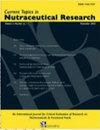桃红四物汤促进单室膝关节置换术后康复的临床疗效观察
IF 0.4
4区 医学
Q4 NUTRITION & DIETETICS
Current Topics in Nutraceutical Research
Pub Date : 2022-04-13
DOI:10.37290/ctnr2641-452x.20:710-715
引用次数: 0
摘要
本研究旨在探讨桃红四物汤在单室膝关节置换术后恢复中的作用。采用随机数表法将80例接受单室膝关节置换术的膝关节炎患者分为研究组和对照组。对照组采用镇痛药治疗,术后按推荐的护理标准进行常规功能锻炼,研究组加用桃红四物汤治疗。研究组的总有效率为95.00%(38/40),显著高于对照组的70.00%(28/40)。研究组表现出比对照组更好的运动能力。术后两组皮肤温度先升高后降低,研究组皮肤温度明显低于对照组。与对照组相比,研究组的Lysholm评分(衡量膝盖特定症状的指标)明显更高。研究组和对照组的不良反应发生率分别为5.00%和7.25%,差异无统计学意义。桃红四物汤对单室膝关节置换术后的原发性关节炎患者,能有效缓解疼痛,降低炎性细胞因子含量,提高膝关节功能,提高运动能力,提高生存能力。本文章由计算机程序翻译,如有差异,请以英文原文为准。
The Clinical Efficacy of Taohong Siwu Decoction in Facilitating Recovery from Postoperative Unicompartmental Knee Arthroplasty
The present study was designed to investigate the role of Taohong Siwu decoction in postoperative recovery from unicompartmental knee arthroplasty. Eighty gonitis patients undergoing unicompartmental knee arthroplasty were recruited and divided into study and control groups using the random number table method. The control group was treated with analgesics and performed routine functional exercise after the operation as per the recommended standard of care, while those in the study group were additionally treated with Taohong Siwu decoction. The total effectiveness rate for the study group was 95.00% (38/40), which was significantly higher than the control group’s 70.00% (28/40). The study group shows better exercise ability than the control group. While after the operation, the skin temperature in two groups increased and then decreased, the skin temperature in the study group was significantly lower than that in the control group. The Lysholm scores, a measure of knee-specific symptoms, were significantly higher in the study group compared to the control. The adverse reaction rates in the study and control groups were 5.00% and 7.25%, respectively, and the difference was not statistically significant. Taohong Siwu decoction can effectively help relieve pain, reduce the inflammatory cytokine content, elevate the knee joint function, improve the exercise ability, and improve the living ability of gonitis patients undergoing unicompartmental knee arthroplasty.
求助全文
通过发布文献求助,成功后即可免费获取论文全文。
去求助
来源期刊
CiteScore
1.10
自引率
0.00%
发文量
36
审稿时长
>12 weeks
期刊介绍:
Current Topics in Nutraceutical Research is an international, interdisciplinary broad-based peer reviewed scientific journal for critical evaluation of research on chemistry, biology and therapeutic applications of nutraceuticals and functional foods. The major goal of this journal is to provide peer reviewed unbiased scientific data to the decision makers in the nutraceutical and food industry to help make informed choices about development of new products.
To this end, the journal will publish two types of review articles. First, a review of preclinical research data coming largely from animal, cell culture and other experimental models. Such data will provide basis for future product development and/or human research initiatives. Second, a critical evaluation of current human experimental data to help market and deliver the product for medically proven use. This journal will also serve as a forum for nutritionists, internists, neurologists, psychiatrists, and all those interested in preventive medicine.
The common denominator of all of the topic to be covered by the journal must include nutraceuticals and/functional food. The following is an example of some specific areas that may be of interest to the journal. i) Role of vitamins, minerals, antioxidants and phytonutrients on cardiovascular health, cancer, diabetes, ocular health, mental health, men’s health, women’s health, infant nutrition, ii) Role of herbals on human health, iii) Dietary supplements and sleep, iv) Components of diet that may have beneficial effect on human health, v) regulation of apoptosis and cell viability, vi) Isolation and characterization of bioactive components from functional foods, vii) Nutritional genomics, and viii) Nutritional proteomics.

 求助内容:
求助内容: 应助结果提醒方式:
应助结果提醒方式:


